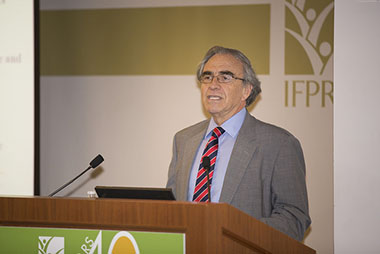Agriculture and financial policies are closely linked. The economic situation of the world—and of each individual country—has a profound effect on agricultural policies, and agricultural policies, in turn, can affect a country’s economy. Thus, taking into account macroeconomic variables and policies is vital to both developing countries’ and the world’s economy.
How can policymakers working in agriculture apply key macroeconomic principles to their work? And which principles are most important for them to know to create effective policies?
At a recent IFPRI policy seminar, a panel of experts from IFPRI’s Markets, Trade, and Institutions Division, as well as the Inter-American Development Bank, discussed why macroeconomic principles are important to use as a guide in making policy decisions in developing countries. The seminar introduced the new IFPRI book, Macroeconomics, Agriculture, and Food Security: A Guide to Policy Analysis in Developing Countries, by visiting IFPRI senior research fellow Eugenio Diaz-Bonilla.
The book lays out a series of lessons and advice on fiscal, monetary, exchange rate, and trade policies. According to Diaz-Bonilla, there are two critical principles policymakers should follow when designing public policies:
- The Tinbergen rule: The number of policy instruments should equal the number of objectives. Using just one instrument to achieve multiple objectives will not be effective. One needs a policy instrument for each objective sought.
- The Bhagwati principle: Policy interventions should be tailored as closely as possible to the intended objective. If the chosen objective is to reduce individual hunger, he said, the policy intervention should focus on people as opposed to crops.
Joseph Glauber, senior research fellow at IFPRI, noted that “relationships between macroeconomics and agriculture are extremely complicated.”
For example, the food price crisis of 2007-2008 was worrisome for urban consumers in developing countries who must buy food. The raised prices, however, simultaneously helped agricultural households, lifting many out of extreme poverty.
“If you’re not careful, addressing one problem without taking into account the implications in other areas can lead to problems,” said Glauber.
Alejandro Izquierdo, principal technical leader and economist at the Inter-American Development Bank, looked from a broader perspective at how commodity prices affect macroeconomics. He presented a specific econometric model that estimated how external variables, including world commodity prices, can have substantial impacts on both macroeconomic performance and a country’s vulnerability to financial crises.
Izquierdo and the other speakers all stressed that communication between sectors is important, be it between macro and microeconomics or a country’s Minister of Agriculture and Minister of Finance.
“In many places, the ministry of agriculture is an island,” Maximo Torero, director of IFPRI’s Markets, Trade, and Institutions Division, said. “The ministry of finance is another island, and they don’t talk much to each other.”
Torero also observed that, continuing a long-standing area of inquiry at IFPRI, Diaz-Bonilla’s book emphasized the link between macroeconomics and agricultural policy, and the crucial linkages to food security.
“It is very important to understand the key elements of macroeconomics when making inclusive policy decisions,” said Torero. “If you want to create inclusion and reduce inequality—especially in developing countries—you need to look at rural areas, and agriculture is a huge player.”







